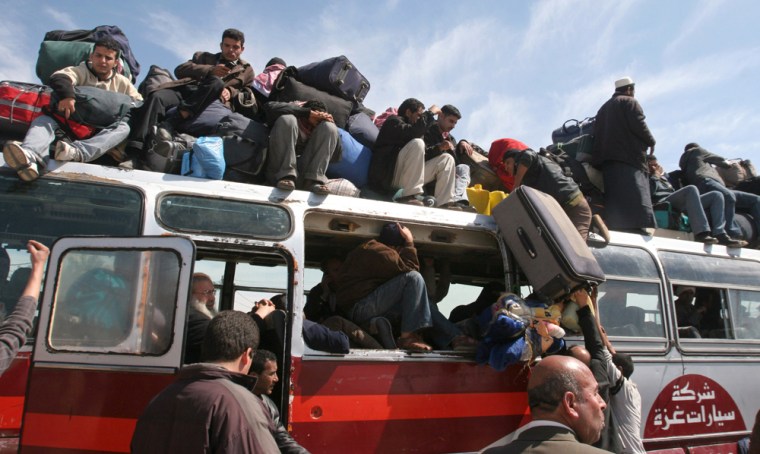Palestinians desperate to cross into Egypt from Gaza surged toward a border terminal Thursday, throwing stones as security personnel fired their weapons to maintain control. Seven people were injured, medics said.
Citing security threats, Israel allows the Rafah crossing — Gaza’s only gateway to the outside world — to operate only sporadically, leading to massive crowds on the rare occasions it opens. Some 5,000 people showed up ahead of its opening Thursday, many sleeping there overnight.
A 61-year-old man on his way to a medical checkup in Egypt died of a heart attack outside the crossing, but the circumstances of his death were not immediately clear.
Abdel Hadi Salama, who was traveling to Egypt to visit relatives, said the Palestinian security personnel at the crossing rapidly lost control of the crowds, who began surging toward the terminal and throwing stones at the entrance gate. Security men opened fire in the air, he said. Medics said two of the wounded were hit by gunfire.
“It’s like the end of the world,” Salama said, speaking by cell phone from inside the crossing terminal.
European observers in charge of the crossing shut the terminal after losing control of the crowds, said Jose Vericat, a spokesman for the observers.
“It was impossible for the Palestinian security personnel to keep control,” Vericat said.
Many of the Gazans waiting outside the terminal had repeatedly tried to cross before. Ibrahim Atamneh, 22, a law student in Cairo, said this was his fourth attempt to get to Egypt.
Fathi Hassanin, who trades in used car parts, said he needed to catch a plane from Egypt to Germany for a business trip, and was afraid that if he didn’t get across he wouldn’t make it before his European Union visa expired March 15. He said he spent the night on the side of a road outside the terminal.
On the roof of one of the buses waiting outside the terminal, two dozen Palestinians, including children and a grey-bearded man, sat atop piles of luggage.
U.S.-brokered deal not fully in force
A deal brokered by the U.S. in November 2005, months after Israel unilaterally pulled its troops and settlers out of Gaza, tried to guarantee the movement of goods and people in and out of the coastal strip. But the agreement has never been fully implemented, and the Gaza crossings continue to operate far below their capacity.
According to the EU observers, the Rafah crossing has been open less than a fifth of the time since June 2006, when Palestinian militants captured an Israeli soldier in a cross-border raid, sparking an Israeli offensive in Gaza.
The crossing has been used by officials from Hamas, the militant Islamist group that heads the Palestinian government, to bring suitcases of cash into Gaza, circumventing international sanctions. Israel says the crossing has been used to smuggle weapons as well.
“I believe that if we could contain the security threat through effective communication, the Rafah crossing could be open all the time,” Israeli Foreign Ministry spokesman Mark Regev said.
But Palestinian negotiator Saeb Erekat said Israel was using security reasons as a pretext for keeping Rafah closed.
“If the border was open on a regular basis, you wouldn’t see the scenes you witnessed today,” Erekat said.
